Comparative Analysis: Banking Code of Practice and APES 110 in Finance
VerifiedAdded on 2022/11/24
|10
|2721
|404
Report
AI Summary
This report provides a comprehensive analysis of the Banking Code of Practice and the Code of Ethics for Professional Accountants (APES 110), focusing on their roles in the Australian financial sector. The report examines the similarities and differences between the two codes, including their objectives, developers, and target users. It explores the needs that each code addresses, such as account sustainability, privacy, and professional judgment. Furthermore, the report assesses the effectiveness of both codes in achieving their goals, considering factors like the Hayne Royal Commission's findings and the codes' ability to mitigate fraud and improve ethical conduct. The analysis highlights the impact of these codes on banking practices, accounting services, and the overall financial landscape in Australia, emphasizing their importance in safeguarding public interest and ensuring responsible financial operations.
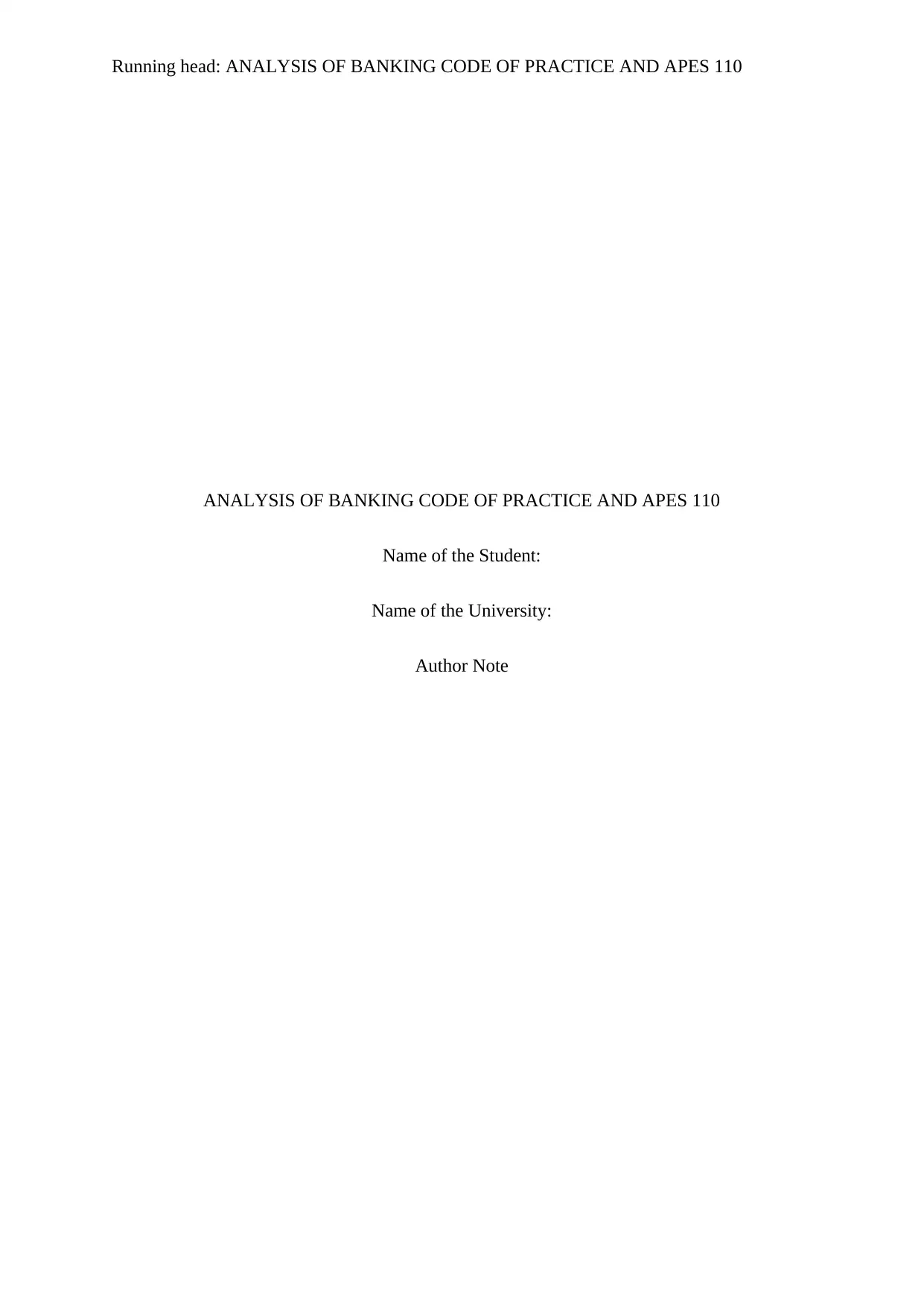
Running head: ANALYSIS OF BANKING CODE OF PRACTICE AND APES 110
ANALYSIS OF BANKING CODE OF PRACTICE AND APES 110
Name of the Student:
Name of the University:
Author Note
ANALYSIS OF BANKING CODE OF PRACTICE AND APES 110
Name of the Student:
Name of the University:
Author Note
Paraphrase This Document
Need a fresh take? Get an instant paraphrase of this document with our AI Paraphraser
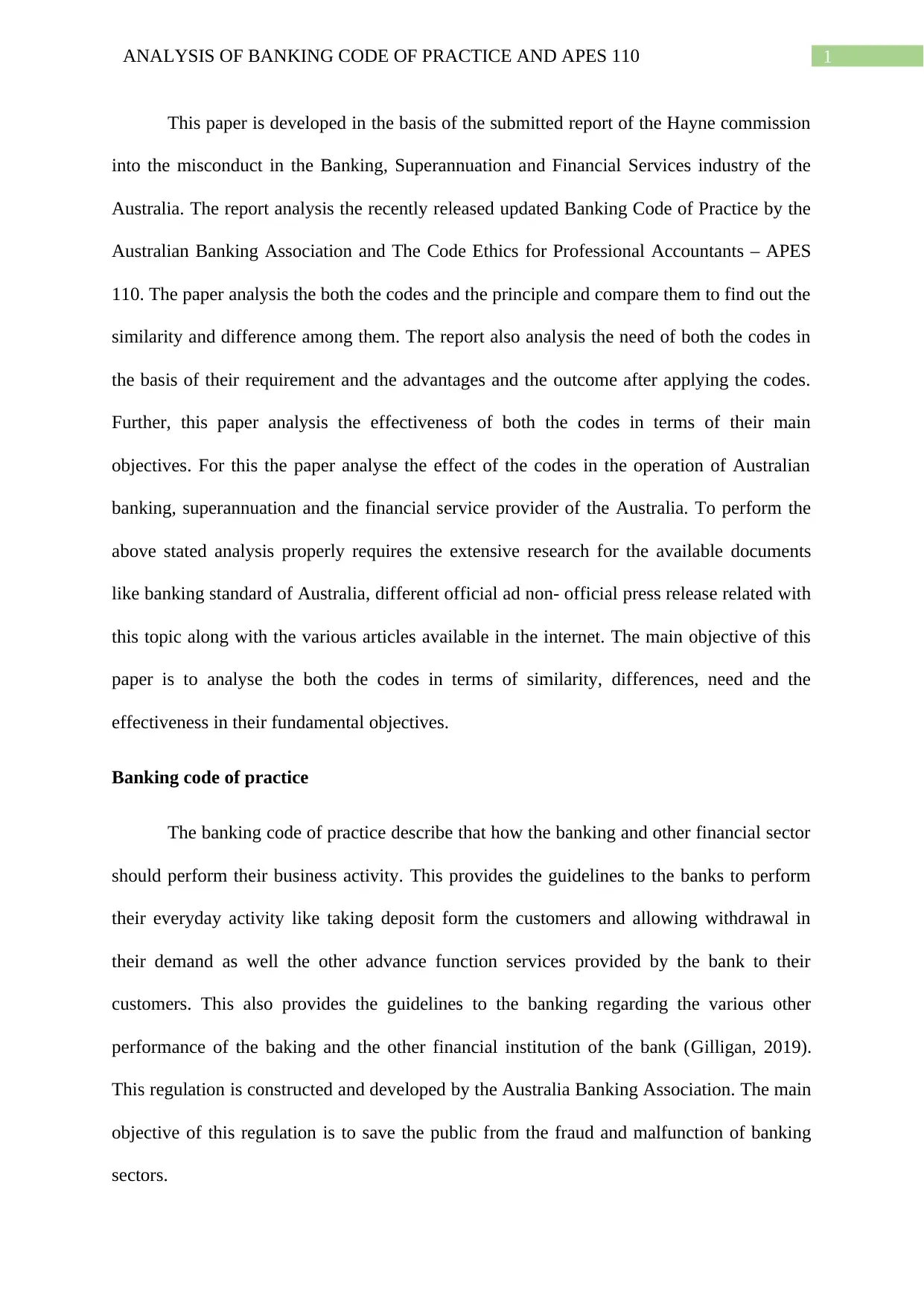
1ANALYSIS OF BANKING CODE OF PRACTICE AND APES 110
This paper is developed in the basis of the submitted report of the Hayne commission
into the misconduct in the Banking, Superannuation and Financial Services industry of the
Australia. The report analysis the recently released updated Banking Code of Practice by the
Australian Banking Association and The Code Ethics for Professional Accountants – APES
110. The paper analysis the both the codes and the principle and compare them to find out the
similarity and difference among them. The report also analysis the need of both the codes in
the basis of their requirement and the advantages and the outcome after applying the codes.
Further, this paper analysis the effectiveness of both the codes in terms of their main
objectives. For this the paper analyse the effect of the codes in the operation of Australian
banking, superannuation and the financial service provider of the Australia. To perform the
above stated analysis properly requires the extensive research for the available documents
like banking standard of Australia, different official ad non- official press release related with
this topic along with the various articles available in the internet. The main objective of this
paper is to analyse the both the codes in terms of similarity, differences, need and the
effectiveness in their fundamental objectives.
Banking code of practice
The banking code of practice describe that how the banking and other financial sector
should perform their business activity. This provides the guidelines to the banks to perform
their everyday activity like taking deposit form the customers and allowing withdrawal in
their demand as well the other advance function services provided by the bank to their
customers. This also provides the guidelines to the banking regarding the various other
performance of the baking and the other financial institution of the bank (Gilligan, 2019).
This regulation is constructed and developed by the Australia Banking Association. The main
objective of this regulation is to save the public from the fraud and malfunction of banking
sectors.
This paper is developed in the basis of the submitted report of the Hayne commission
into the misconduct in the Banking, Superannuation and Financial Services industry of the
Australia. The report analysis the recently released updated Banking Code of Practice by the
Australian Banking Association and The Code Ethics for Professional Accountants – APES
110. The paper analysis the both the codes and the principle and compare them to find out the
similarity and difference among them. The report also analysis the need of both the codes in
the basis of their requirement and the advantages and the outcome after applying the codes.
Further, this paper analysis the effectiveness of both the codes in terms of their main
objectives. For this the paper analyse the effect of the codes in the operation of Australian
banking, superannuation and the financial service provider of the Australia. To perform the
above stated analysis properly requires the extensive research for the available documents
like banking standard of Australia, different official ad non- official press release related with
this topic along with the various articles available in the internet. The main objective of this
paper is to analyse the both the codes in terms of similarity, differences, need and the
effectiveness in their fundamental objectives.
Banking code of practice
The banking code of practice describe that how the banking and other financial sector
should perform their business activity. This provides the guidelines to the banks to perform
their everyday activity like taking deposit form the customers and allowing withdrawal in
their demand as well the other advance function services provided by the bank to their
customers. This also provides the guidelines to the banking regarding the various other
performance of the baking and the other financial institution of the bank (Gilligan, 2019).
This regulation is constructed and developed by the Australia Banking Association. The main
objective of this regulation is to save the public from the fraud and malfunction of banking
sectors.
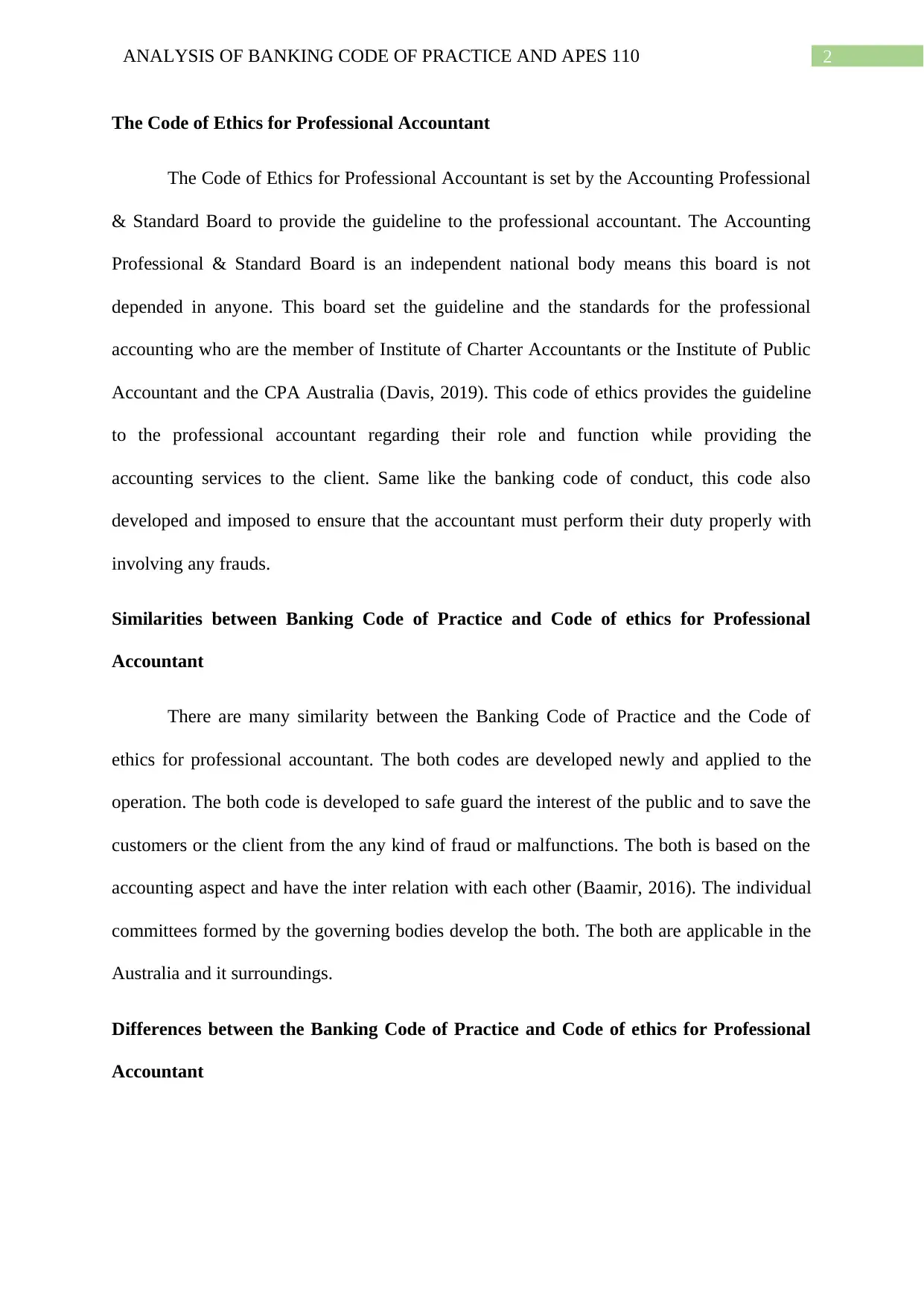
2ANALYSIS OF BANKING CODE OF PRACTICE AND APES 110
The Code of Ethics for Professional Accountant
The Code of Ethics for Professional Accountant is set by the Accounting Professional
& Standard Board to provide the guideline to the professional accountant. The Accounting
Professional & Standard Board is an independent national body means this board is not
depended in anyone. This board set the guideline and the standards for the professional
accounting who are the member of Institute of Charter Accountants or the Institute of Public
Accountant and the CPA Australia (Davis, 2019). This code of ethics provides the guideline
to the professional accountant regarding their role and function while providing the
accounting services to the client. Same like the banking code of conduct, this code also
developed and imposed to ensure that the accountant must perform their duty properly with
involving any frauds.
Similarities between Banking Code of Practice and Code of ethics for Professional
Accountant
There are many similarity between the Banking Code of Practice and the Code of
ethics for professional accountant. The both codes are developed newly and applied to the
operation. The both code is developed to safe guard the interest of the public and to save the
customers or the client from the any kind of fraud or malfunctions. The both is based on the
accounting aspect and have the inter relation with each other (Baamir, 2016). The individual
committees formed by the governing bodies develop the both. The both are applicable in the
Australia and it surroundings.
Differences between the Banking Code of Practice and Code of ethics for Professional
Accountant
The Code of Ethics for Professional Accountant
The Code of Ethics for Professional Accountant is set by the Accounting Professional
& Standard Board to provide the guideline to the professional accountant. The Accounting
Professional & Standard Board is an independent national body means this board is not
depended in anyone. This board set the guideline and the standards for the professional
accounting who are the member of Institute of Charter Accountants or the Institute of Public
Accountant and the CPA Australia (Davis, 2019). This code of ethics provides the guideline
to the professional accountant regarding their role and function while providing the
accounting services to the client. Same like the banking code of conduct, this code also
developed and imposed to ensure that the accountant must perform their duty properly with
involving any frauds.
Similarities between Banking Code of Practice and Code of ethics for Professional
Accountant
There are many similarity between the Banking Code of Practice and the Code of
ethics for professional accountant. The both codes are developed newly and applied to the
operation. The both code is developed to safe guard the interest of the public and to save the
customers or the client from the any kind of fraud or malfunctions. The both is based on the
accounting aspect and have the inter relation with each other (Baamir, 2016). The individual
committees formed by the governing bodies develop the both. The both are applicable in the
Australia and it surroundings.
Differences between the Banking Code of Practice and Code of ethics for Professional
Accountant
⊘ This is a preview!⊘
Do you want full access?
Subscribe today to unlock all pages.

Trusted by 1+ million students worldwide
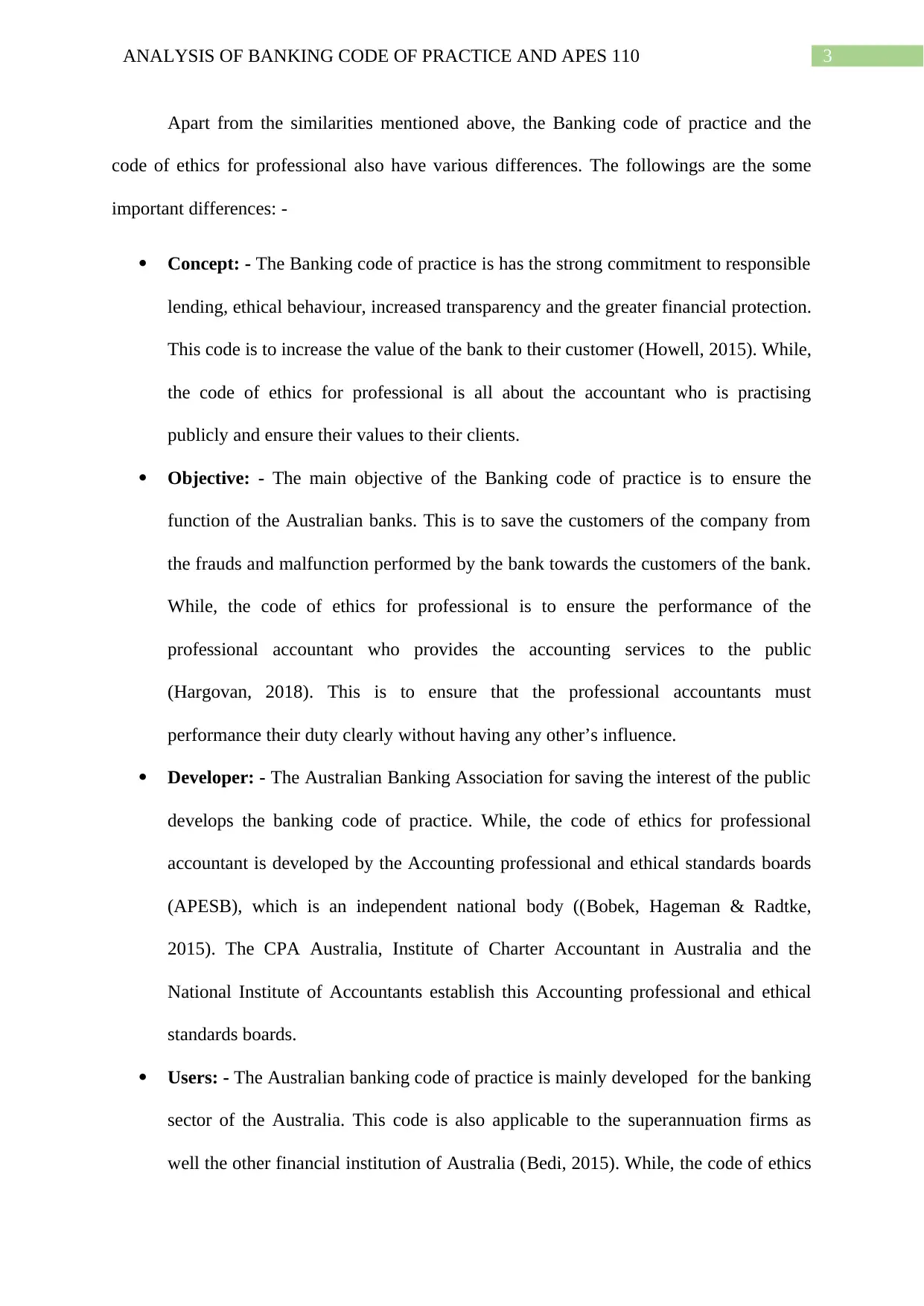
3ANALYSIS OF BANKING CODE OF PRACTICE AND APES 110
Apart from the similarities mentioned above, the Banking code of practice and the
code of ethics for professional also have various differences. The followings are the some
important differences: -
Concept: - The Banking code of practice is has the strong commitment to responsible
lending, ethical behaviour, increased transparency and the greater financial protection.
This code is to increase the value of the bank to their customer (Howell, 2015). While,
the code of ethics for professional is all about the accountant who is practising
publicly and ensure their values to their clients.
Objective: - The main objective of the Banking code of practice is to ensure the
function of the Australian banks. This is to save the customers of the company from
the frauds and malfunction performed by the bank towards the customers of the bank.
While, the code of ethics for professional is to ensure the performance of the
professional accountant who provides the accounting services to the public
(Hargovan, 2018). This is to ensure that the professional accountants must
performance their duty clearly without having any other’s influence.
Developer: - The Australian Banking Association for saving the interest of the public
develops the banking code of practice. While, the code of ethics for professional
accountant is developed by the Accounting professional and ethical standards boards
(APESB), which is an independent national body ((Bobek, Hageman & Radtke,
2015). The CPA Australia, Institute of Charter Accountant in Australia and the
National Institute of Accountants establish this Accounting professional and ethical
standards boards.
Users: - The Australian banking code of practice is mainly developed for the banking
sector of the Australia. This code is also applicable to the superannuation firms as
well the other financial institution of Australia (Bedi, 2015). While, the code of ethics
Apart from the similarities mentioned above, the Banking code of practice and the
code of ethics for professional also have various differences. The followings are the some
important differences: -
Concept: - The Banking code of practice is has the strong commitment to responsible
lending, ethical behaviour, increased transparency and the greater financial protection.
This code is to increase the value of the bank to their customer (Howell, 2015). While,
the code of ethics for professional is all about the accountant who is practising
publicly and ensure their values to their clients.
Objective: - The main objective of the Banking code of practice is to ensure the
function of the Australian banks. This is to save the customers of the company from
the frauds and malfunction performed by the bank towards the customers of the bank.
While, the code of ethics for professional is to ensure the performance of the
professional accountant who provides the accounting services to the public
(Hargovan, 2018). This is to ensure that the professional accountants must
performance their duty clearly without having any other’s influence.
Developer: - The Australian Banking Association for saving the interest of the public
develops the banking code of practice. While, the code of ethics for professional
accountant is developed by the Accounting professional and ethical standards boards
(APESB), which is an independent national body ((Bobek, Hageman & Radtke,
2015). The CPA Australia, Institute of Charter Accountant in Australia and the
National Institute of Accountants establish this Accounting professional and ethical
standards boards.
Users: - The Australian banking code of practice is mainly developed for the banking
sector of the Australia. This code is also applicable to the superannuation firms as
well the other financial institution of Australia (Bedi, 2015). While, the code of ethics
Paraphrase This Document
Need a fresh take? Get an instant paraphrase of this document with our AI Paraphraser
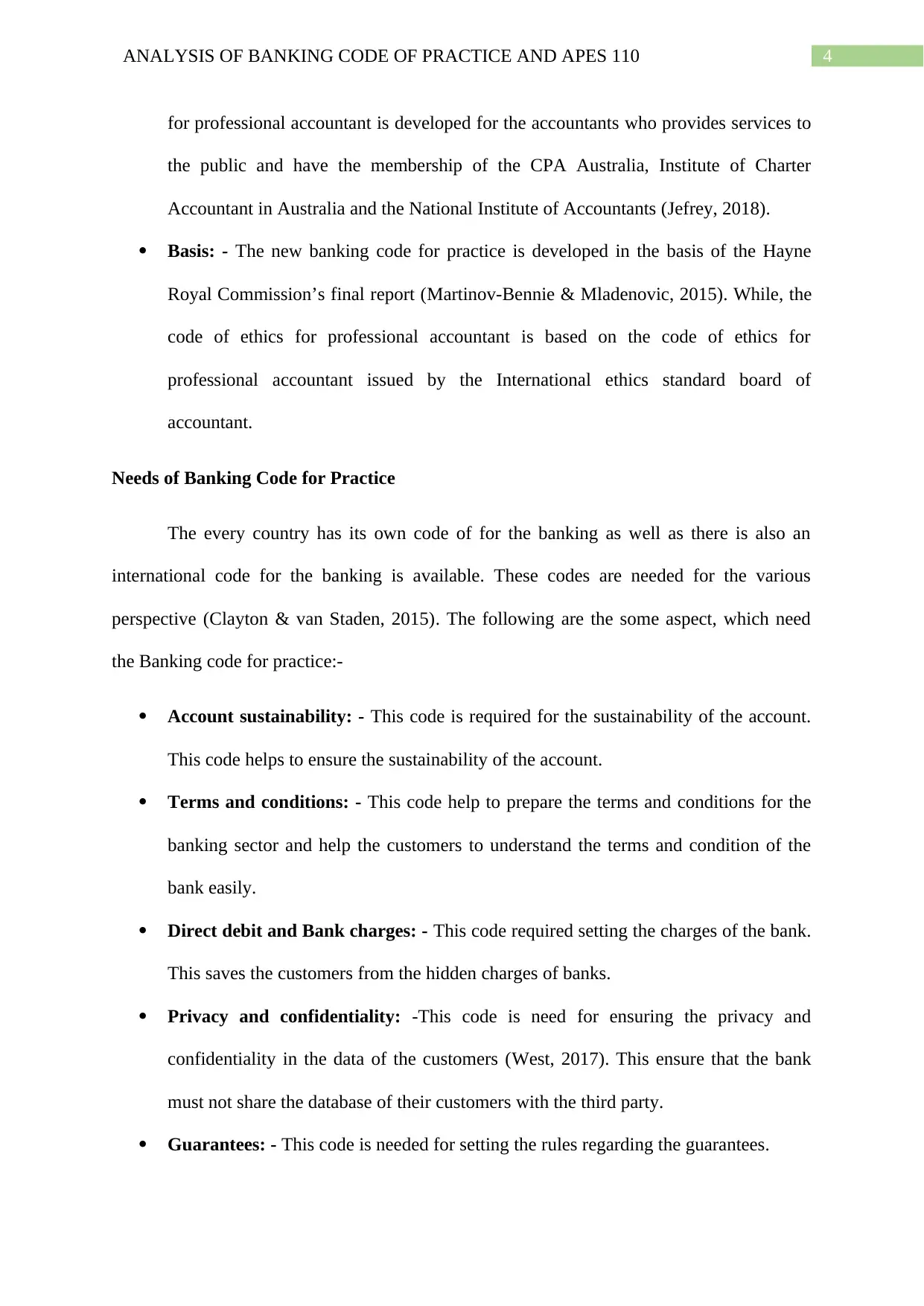
4ANALYSIS OF BANKING CODE OF PRACTICE AND APES 110
for professional accountant is developed for the accountants who provides services to
the public and have the membership of the CPA Australia, Institute of Charter
Accountant in Australia and the National Institute of Accountants (Jefrey, 2018).
Basis: - The new banking code for practice is developed in the basis of the Hayne
Royal Commission’s final report (Martinov-Bennie & Mladenovic, 2015). While, the
code of ethics for professional accountant is based on the code of ethics for
professional accountant issued by the International ethics standard board of
accountant.
Needs of Banking Code for Practice
The every country has its own code of for the banking as well as there is also an
international code for the banking is available. These codes are needed for the various
perspective (Clayton & van Staden, 2015). The following are the some aspect, which need
the Banking code for practice:-
Account sustainability: - This code is required for the sustainability of the account.
This code helps to ensure the sustainability of the account.
Terms and conditions: - This code help to prepare the terms and conditions for the
banking sector and help the customers to understand the terms and condition of the
bank easily.
Direct debit and Bank charges: - This code required setting the charges of the bank.
This saves the customers from the hidden charges of banks.
Privacy and confidentiality: -This code is need for ensuring the privacy and
confidentiality in the data of the customers (West, 2017). This ensure that the bank
must not share the database of their customers with the third party.
Guarantees: - This code is needed for setting the rules regarding the guarantees.
for professional accountant is developed for the accountants who provides services to
the public and have the membership of the CPA Australia, Institute of Charter
Accountant in Australia and the National Institute of Accountants (Jefrey, 2018).
Basis: - The new banking code for practice is developed in the basis of the Hayne
Royal Commission’s final report (Martinov-Bennie & Mladenovic, 2015). While, the
code of ethics for professional accountant is based on the code of ethics for
professional accountant issued by the International ethics standard board of
accountant.
Needs of Banking Code for Practice
The every country has its own code of for the banking as well as there is also an
international code for the banking is available. These codes are needed for the various
perspective (Clayton & van Staden, 2015). The following are the some aspect, which need
the Banking code for practice:-
Account sustainability: - This code is required for the sustainability of the account.
This code helps to ensure the sustainability of the account.
Terms and conditions: - This code help to prepare the terms and conditions for the
banking sector and help the customers to understand the terms and condition of the
bank easily.
Direct debit and Bank charges: - This code required setting the charges of the bank.
This saves the customers from the hidden charges of banks.
Privacy and confidentiality: -This code is need for ensuring the privacy and
confidentiality in the data of the customers (West, 2017). This ensure that the bank
must not share the database of their customers with the third party.
Guarantees: - This code is needed for setting the rules regarding the guarantees.
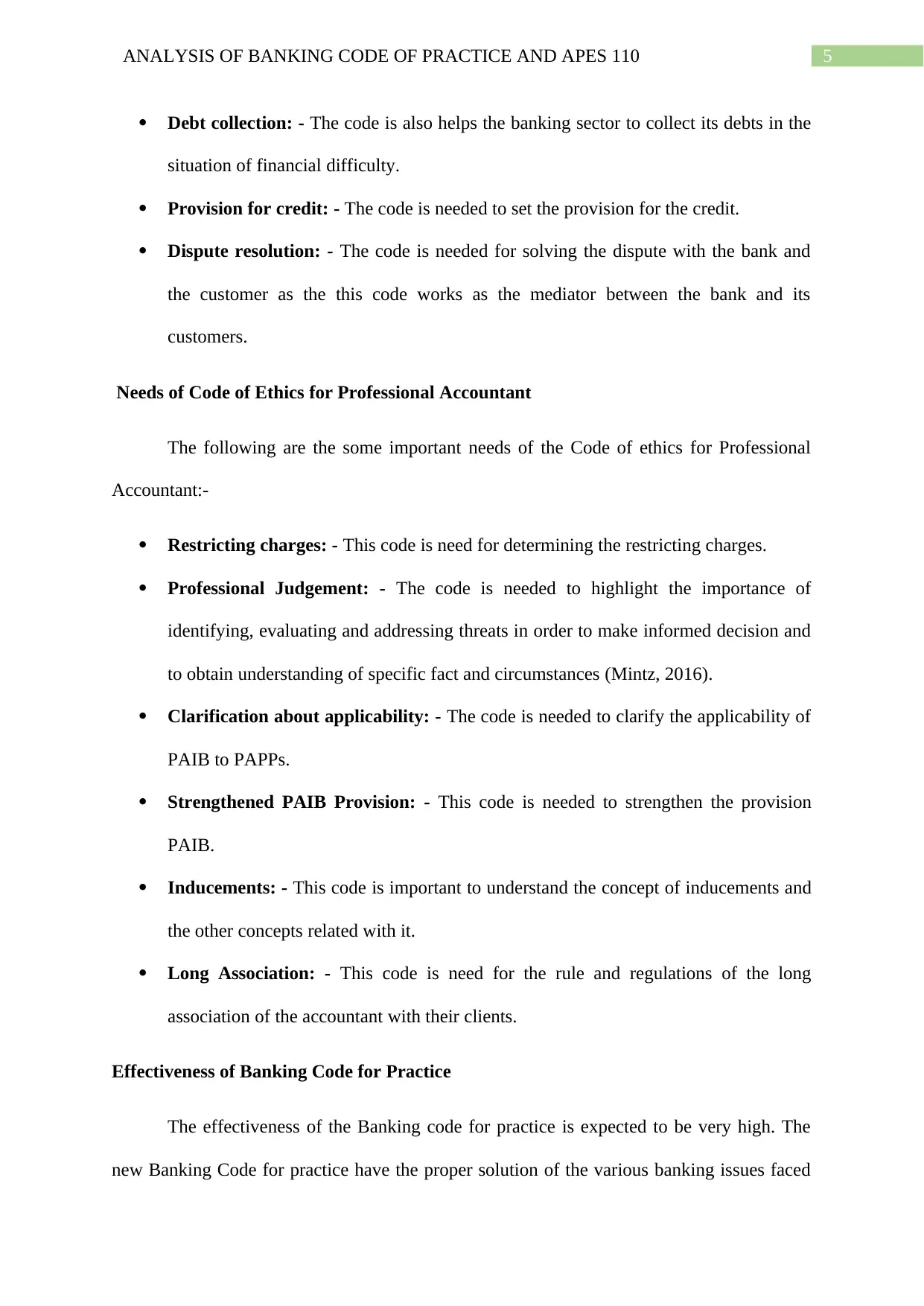
5ANALYSIS OF BANKING CODE OF PRACTICE AND APES 110
Debt collection: - The code is also helps the banking sector to collect its debts in the
situation of financial difficulty.
Provision for credit: - The code is needed to set the provision for the credit.
Dispute resolution: - The code is needed for solving the dispute with the bank and
the customer as the this code works as the mediator between the bank and its
customers.
Needs of Code of Ethics for Professional Accountant
The following are the some important needs of the Code of ethics for Professional
Accountant:-
Restricting charges: - This code is need for determining the restricting charges.
Professional Judgement: - The code is needed to highlight the importance of
identifying, evaluating and addressing threats in order to make informed decision and
to obtain understanding of specific fact and circumstances (Mintz, 2016).
Clarification about applicability: - The code is needed to clarify the applicability of
PAIB to PAPPs.
Strengthened PAIB Provision: - This code is needed to strengthen the provision
PAIB.
Inducements: - This code is important to understand the concept of inducements and
the other concepts related with it.
Long Association: - This code is need for the rule and regulations of the long
association of the accountant with their clients.
Effectiveness of Banking Code for Practice
The effectiveness of the Banking code for practice is expected to be very high. The
new Banking Code for practice have the proper solution of the various banking issues faced
Debt collection: - The code is also helps the banking sector to collect its debts in the
situation of financial difficulty.
Provision for credit: - The code is needed to set the provision for the credit.
Dispute resolution: - The code is needed for solving the dispute with the bank and
the customer as the this code works as the mediator between the bank and its
customers.
Needs of Code of Ethics for Professional Accountant
The following are the some important needs of the Code of ethics for Professional
Accountant:-
Restricting charges: - This code is need for determining the restricting charges.
Professional Judgement: - The code is needed to highlight the importance of
identifying, evaluating and addressing threats in order to make informed decision and
to obtain understanding of specific fact and circumstances (Mintz, 2016).
Clarification about applicability: - The code is needed to clarify the applicability of
PAIB to PAPPs.
Strengthened PAIB Provision: - This code is needed to strengthen the provision
PAIB.
Inducements: - This code is important to understand the concept of inducements and
the other concepts related with it.
Long Association: - This code is need for the rule and regulations of the long
association of the accountant with their clients.
Effectiveness of Banking Code for Practice
The effectiveness of the Banking code for practice is expected to be very high. The
new Banking Code for practice have the proper solution of the various banking issues faced
⊘ This is a preview!⊘
Do you want full access?
Subscribe today to unlock all pages.

Trusted by 1+ million students worldwide
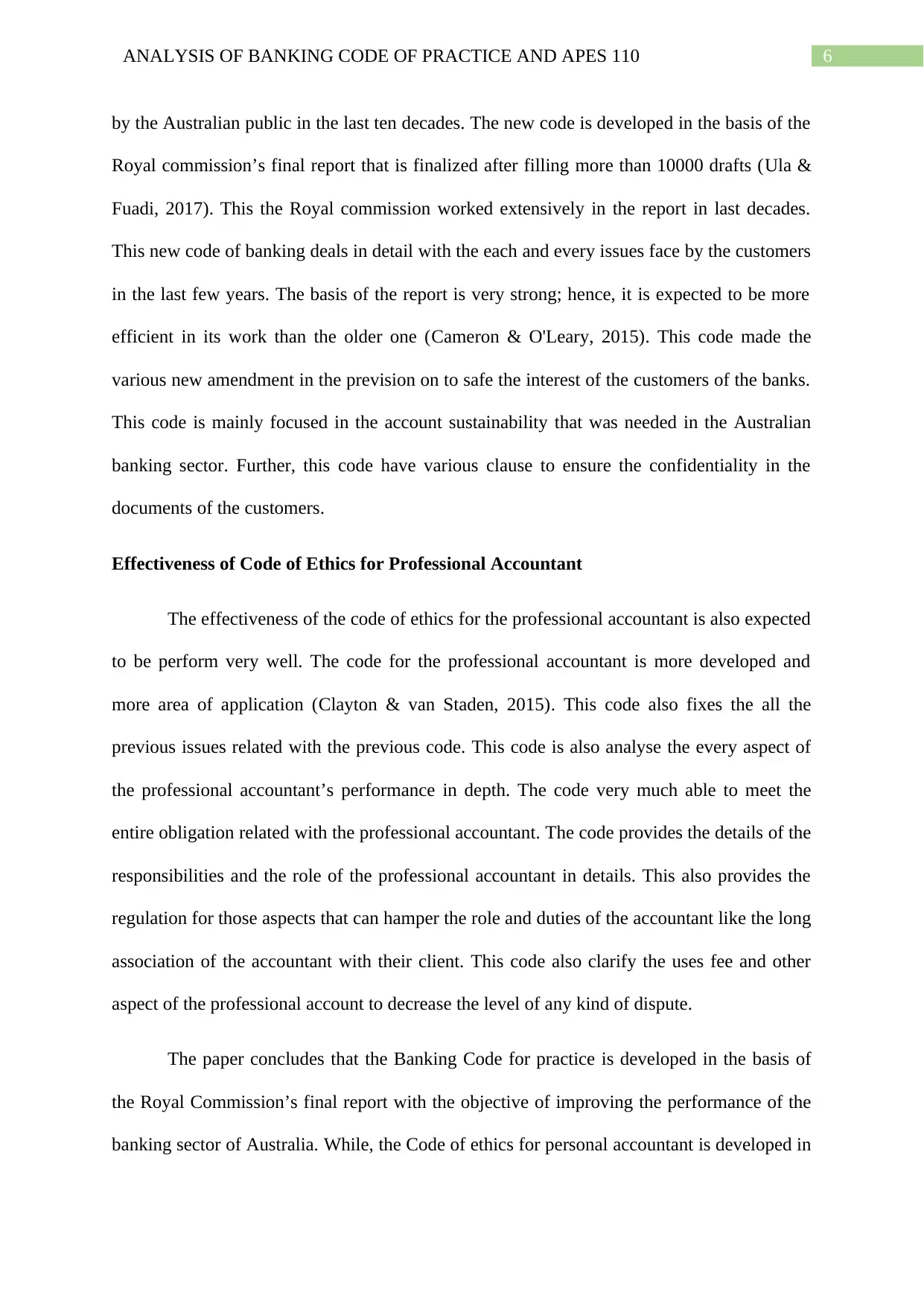
6ANALYSIS OF BANKING CODE OF PRACTICE AND APES 110
by the Australian public in the last ten decades. The new code is developed in the basis of the
Royal commission’s final report that is finalized after filling more than 10000 drafts (Ula &
Fuadi, 2017). This the Royal commission worked extensively in the report in last decades.
This new code of banking deals in detail with the each and every issues face by the customers
in the last few years. The basis of the report is very strong; hence, it is expected to be more
efficient in its work than the older one (Cameron & O'Leary, 2015). This code made the
various new amendment in the prevision on to safe the interest of the customers of the banks.
This code is mainly focused in the account sustainability that was needed in the Australian
banking sector. Further, this code have various clause to ensure the confidentiality in the
documents of the customers.
Effectiveness of Code of Ethics for Professional Accountant
The effectiveness of the code of ethics for the professional accountant is also expected
to be perform very well. The code for the professional accountant is more developed and
more area of application (Clayton & van Staden, 2015). This code also fixes the all the
previous issues related with the previous code. This code is also analyse the every aspect of
the professional accountant’s performance in depth. The code very much able to meet the
entire obligation related with the professional accountant. The code provides the details of the
responsibilities and the role of the professional accountant in details. This also provides the
regulation for those aspects that can hamper the role and duties of the accountant like the long
association of the accountant with their client. This code also clarify the uses fee and other
aspect of the professional account to decrease the level of any kind of dispute.
The paper concludes that the Banking Code for practice is developed in the basis of
the Royal Commission’s final report with the objective of improving the performance of the
banking sector of Australia. While, the Code of ethics for personal accountant is developed in
by the Australian public in the last ten decades. The new code is developed in the basis of the
Royal commission’s final report that is finalized after filling more than 10000 drafts (Ula &
Fuadi, 2017). This the Royal commission worked extensively in the report in last decades.
This new code of banking deals in detail with the each and every issues face by the customers
in the last few years. The basis of the report is very strong; hence, it is expected to be more
efficient in its work than the older one (Cameron & O'Leary, 2015). This code made the
various new amendment in the prevision on to safe the interest of the customers of the banks.
This code is mainly focused in the account sustainability that was needed in the Australian
banking sector. Further, this code have various clause to ensure the confidentiality in the
documents of the customers.
Effectiveness of Code of Ethics for Professional Accountant
The effectiveness of the code of ethics for the professional accountant is also expected
to be perform very well. The code for the professional accountant is more developed and
more area of application (Clayton & van Staden, 2015). This code also fixes the all the
previous issues related with the previous code. This code is also analyse the every aspect of
the professional accountant’s performance in depth. The code very much able to meet the
entire obligation related with the professional accountant. The code provides the details of the
responsibilities and the role of the professional accountant in details. This also provides the
regulation for those aspects that can hamper the role and duties of the accountant like the long
association of the accountant with their client. This code also clarify the uses fee and other
aspect of the professional account to decrease the level of any kind of dispute.
The paper concludes that the Banking Code for practice is developed in the basis of
the Royal Commission’s final report with the objective of improving the performance of the
banking sector of Australia. While, the Code of ethics for personal accountant is developed in
Paraphrase This Document
Need a fresh take? Get an instant paraphrase of this document with our AI Paraphraser
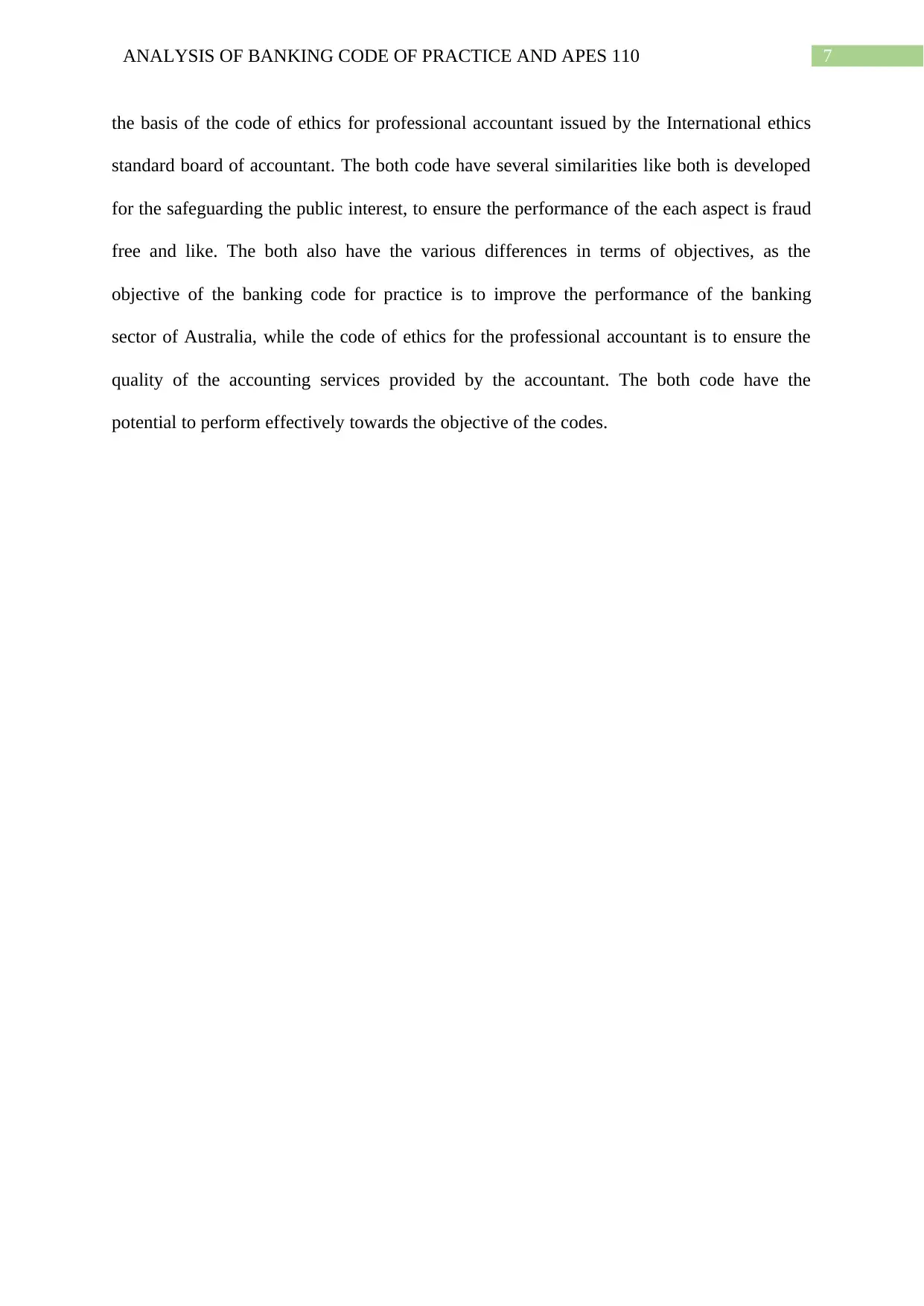
7ANALYSIS OF BANKING CODE OF PRACTICE AND APES 110
the basis of the code of ethics for professional accountant issued by the International ethics
standard board of accountant. The both code have several similarities like both is developed
for the safeguarding the public interest, to ensure the performance of the each aspect is fraud
free and like. The both also have the various differences in terms of objectives, as the
objective of the banking code for practice is to improve the performance of the banking
sector of Australia, while the code of ethics for the professional accountant is to ensure the
quality of the accounting services provided by the accountant. The both code have the
potential to perform effectively towards the objective of the codes.
the basis of the code of ethics for professional accountant issued by the International ethics
standard board of accountant. The both code have several similarities like both is developed
for the safeguarding the public interest, to ensure the performance of the each aspect is fraud
free and like. The both also have the various differences in terms of objectives, as the
objective of the banking code for practice is to improve the performance of the banking
sector of Australia, while the code of ethics for the professional accountant is to ensure the
quality of the accounting services provided by the accountant. The both code have the
potential to perform effectively towards the objective of the codes.
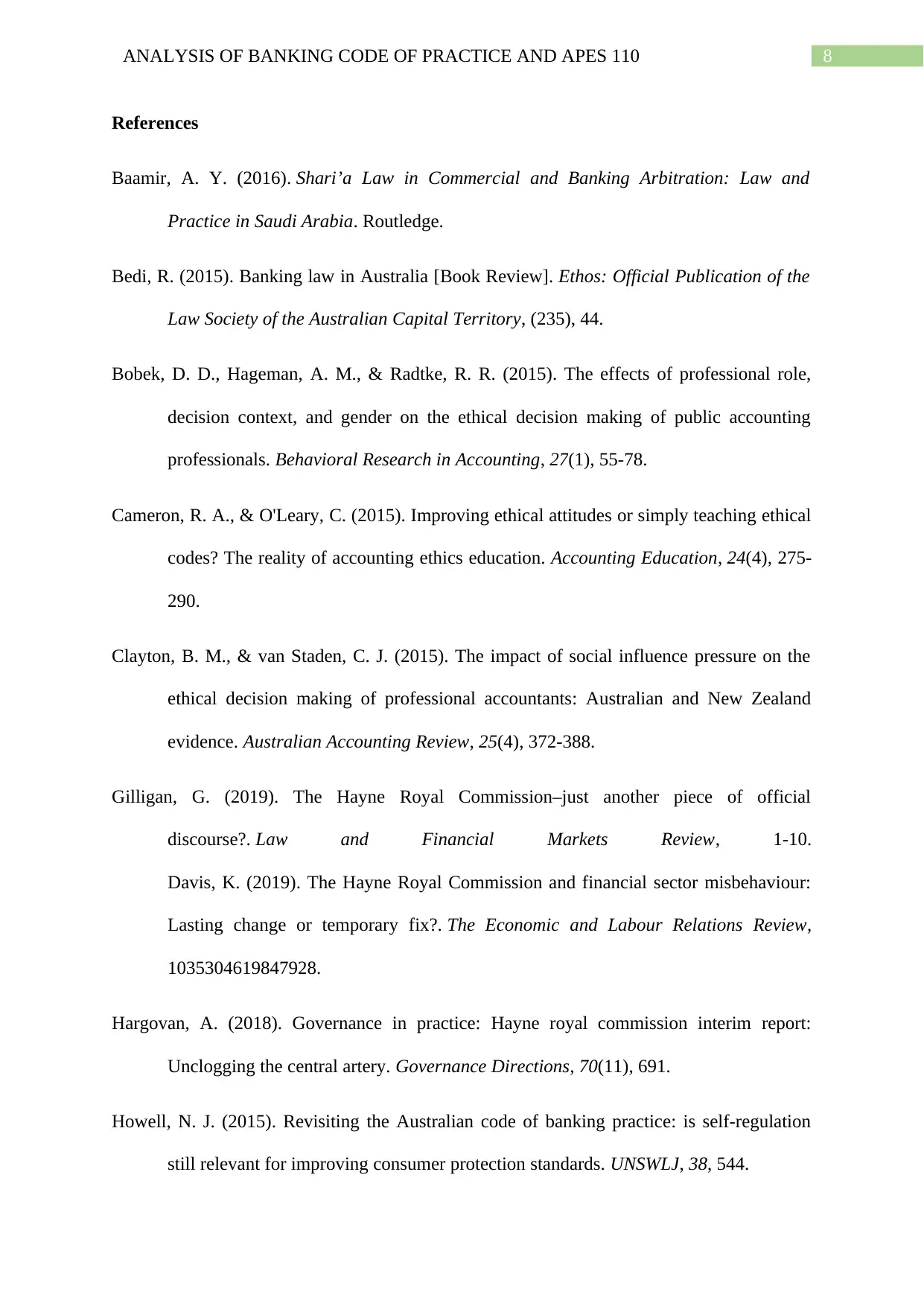
8ANALYSIS OF BANKING CODE OF PRACTICE AND APES 110
References
Baamir, A. Y. (2016). Shari’a Law in Commercial and Banking Arbitration: Law and
Practice in Saudi Arabia. Routledge.
Bedi, R. (2015). Banking law in Australia [Book Review]. Ethos: Official Publication of the
Law Society of the Australian Capital Territory, (235), 44.
Bobek, D. D., Hageman, A. M., & Radtke, R. R. (2015). The effects of professional role,
decision context, and gender on the ethical decision making of public accounting
professionals. Behavioral Research in Accounting, 27(1), 55-78.
Cameron, R. A., & O'Leary, C. (2015). Improving ethical attitudes or simply teaching ethical
codes? The reality of accounting ethics education. Accounting Education, 24(4), 275-
290.
Clayton, B. M., & van Staden, C. J. (2015). The impact of social influence pressure on the
ethical decision making of professional accountants: Australian and New Zealand
evidence. Australian Accounting Review, 25(4), 372-388.
Gilligan, G. (2019). The Hayne Royal Commission–just another piece of official
discourse?. Law and Financial Markets Review, 1-10.
Davis, K. (2019). The Hayne Royal Commission and financial sector misbehaviour:
Lasting change or temporary fix?. The Economic and Labour Relations Review,
1035304619847928.
Hargovan, A. (2018). Governance in practice: Hayne royal commission interim report:
Unclogging the central artery. Governance Directions, 70(11), 691.
Howell, N. J. (2015). Revisiting the Australian code of banking practice: is self-regulation
still relevant for improving consumer protection standards. UNSWLJ, 38, 544.
References
Baamir, A. Y. (2016). Shari’a Law in Commercial and Banking Arbitration: Law and
Practice in Saudi Arabia. Routledge.
Bedi, R. (2015). Banking law in Australia [Book Review]. Ethos: Official Publication of the
Law Society of the Australian Capital Territory, (235), 44.
Bobek, D. D., Hageman, A. M., & Radtke, R. R. (2015). The effects of professional role,
decision context, and gender on the ethical decision making of public accounting
professionals. Behavioral Research in Accounting, 27(1), 55-78.
Cameron, R. A., & O'Leary, C. (2015). Improving ethical attitudes or simply teaching ethical
codes? The reality of accounting ethics education. Accounting Education, 24(4), 275-
290.
Clayton, B. M., & van Staden, C. J. (2015). The impact of social influence pressure on the
ethical decision making of professional accountants: Australian and New Zealand
evidence. Australian Accounting Review, 25(4), 372-388.
Gilligan, G. (2019). The Hayne Royal Commission–just another piece of official
discourse?. Law and Financial Markets Review, 1-10.
Davis, K. (2019). The Hayne Royal Commission and financial sector misbehaviour:
Lasting change or temporary fix?. The Economic and Labour Relations Review,
1035304619847928.
Hargovan, A. (2018). Governance in practice: Hayne royal commission interim report:
Unclogging the central artery. Governance Directions, 70(11), 691.
Howell, N. J. (2015). Revisiting the Australian code of banking practice: is self-regulation
still relevant for improving consumer protection standards. UNSWLJ, 38, 544.
⊘ This is a preview!⊘
Do you want full access?
Subscribe today to unlock all pages.

Trusted by 1+ million students worldwide
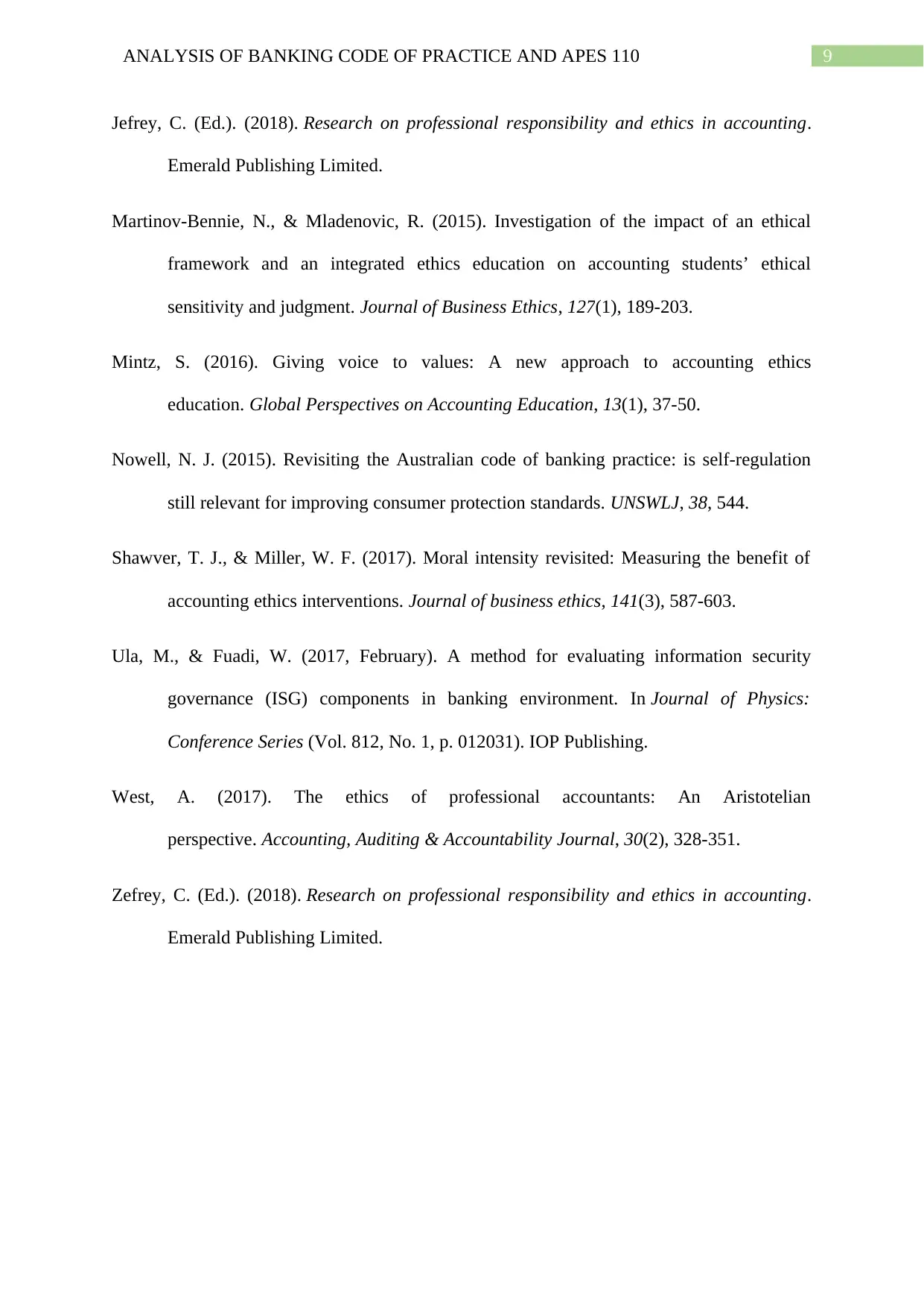
9ANALYSIS OF BANKING CODE OF PRACTICE AND APES 110
Jefrey, C. (Ed.). (2018). Research on professional responsibility and ethics in accounting.
Emerald Publishing Limited.
Martinov-Bennie, N., & Mladenovic, R. (2015). Investigation of the impact of an ethical
framework and an integrated ethics education on accounting students’ ethical
sensitivity and judgment. Journal of Business Ethics, 127(1), 189-203.
Mintz, S. (2016). Giving voice to values: A new approach to accounting ethics
education. Global Perspectives on Accounting Education, 13(1), 37-50.
Nowell, N. J. (2015). Revisiting the Australian code of banking practice: is self-regulation
still relevant for improving consumer protection standards. UNSWLJ, 38, 544.
Shawver, T. J., & Miller, W. F. (2017). Moral intensity revisited: Measuring the benefit of
accounting ethics interventions. Journal of business ethics, 141(3), 587-603.
Ula, M., & Fuadi, W. (2017, February). A method for evaluating information security
governance (ISG) components in banking environment. In Journal of Physics:
Conference Series (Vol. 812, No. 1, p. 012031). IOP Publishing.
West, A. (2017). The ethics of professional accountants: An Aristotelian
perspective. Accounting, Auditing & Accountability Journal, 30(2), 328-351.
Zefrey, C. (Ed.). (2018). Research on professional responsibility and ethics in accounting.
Emerald Publishing Limited.
Jefrey, C. (Ed.). (2018). Research on professional responsibility and ethics in accounting.
Emerald Publishing Limited.
Martinov-Bennie, N., & Mladenovic, R. (2015). Investigation of the impact of an ethical
framework and an integrated ethics education on accounting students’ ethical
sensitivity and judgment. Journal of Business Ethics, 127(1), 189-203.
Mintz, S. (2016). Giving voice to values: A new approach to accounting ethics
education. Global Perspectives on Accounting Education, 13(1), 37-50.
Nowell, N. J. (2015). Revisiting the Australian code of banking practice: is self-regulation
still relevant for improving consumer protection standards. UNSWLJ, 38, 544.
Shawver, T. J., & Miller, W. F. (2017). Moral intensity revisited: Measuring the benefit of
accounting ethics interventions. Journal of business ethics, 141(3), 587-603.
Ula, M., & Fuadi, W. (2017, February). A method for evaluating information security
governance (ISG) components in banking environment. In Journal of Physics:
Conference Series (Vol. 812, No. 1, p. 012031). IOP Publishing.
West, A. (2017). The ethics of professional accountants: An Aristotelian
perspective. Accounting, Auditing & Accountability Journal, 30(2), 328-351.
Zefrey, C. (Ed.). (2018). Research on professional responsibility and ethics in accounting.
Emerald Publishing Limited.
1 out of 10
Related Documents
Your All-in-One AI-Powered Toolkit for Academic Success.
+13062052269
info@desklib.com
Available 24*7 on WhatsApp / Email
![[object Object]](/_next/static/media/star-bottom.7253800d.svg)
Unlock your academic potential
Copyright © 2020–2025 A2Z Services. All Rights Reserved. Developed and managed by ZUCOL.





